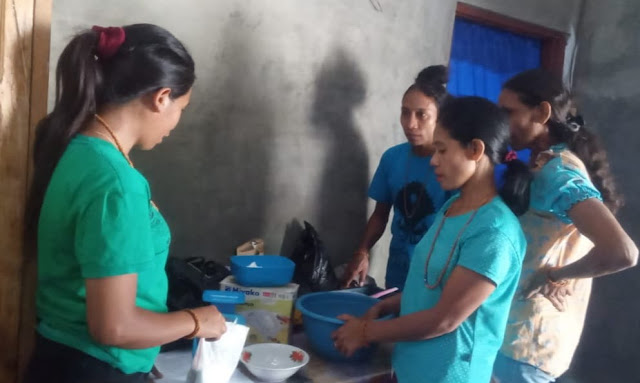Sumba is an island that’s rich with kinds of local food, especially in East Sumba Regency. However, the local food has not been widely consumed by the community, so its availability is not optimal. If it’s managed well, local food has high economic value. The Kawara Panamung weaving group should understand it, so they can take the initiative to develop local food. They are not only involved in weaving cloth but also in processing local food of their area. The women met to discuss what local foods could be processed at the Kawara Panamung weaving workshop (Thursday, October 05, 2023).
On this occasion, they agreed to practice making pumpkin cake. The resource person for this activity was Mrs. Kalita Mburu, a Posyandu (health service) cadre and also the principal of the Bina Kasih Early Childhood School. She has attended local food training at the provincial level, so she could accompany and teach the women of the Kawara Panamung weaving group to make pumpkin cake, from preparing the tools and ingredients to the cooking process. While making cakes, participants shared about the effects of the long dry season by complaining that the price of rice had risen. Currently, one sack of rice that costs IDR 500.000, is increasing to IDR 700.000. This situation makes them busy processing local food to eat and to sell, especially in the Nggaha Ori Angu district.
Now, the local food that is widely processed is iwi or wild yam. It looks like jicama, commonly found in the forest, but the processing method must also be careful. If it is not processed properly, it can make people who consume it intoxicated and even it leads to death. The processing method is that the tubers are thinly sliced, dried in the sun, and soaked in the river for 3 days and three nights to remove the sap. After that, it is dried under the sun, then it can be processed into food in the form of chips, and porridge and can even be mixed with rice.
Several participants shared that they are currently processing iwi as a substitute for rice. Like Mrs. Yohana Day Ngana's experience. "Currently, I have produced 2 sacks of iwi and processed them into rice substitute food, so rice at home runs out slowly," she emphasized. Ms Katrina Pindi Njola also said that eating iwi food can prolong the period of being full. From the experiences above, the writer emphasizes them how important it is to process the available local food. If it’s managed well it will give high selling value.
After exchanging experiences and successfully making pumpkin cakes, they marketed the products on Facebook. The first capital of Rp 200.000 might produce 5 cake pans which were sold for Rp 500.000. The profits goes into the group's cash for their needs for working on clothing, and the capital is prepared to use for other local food production. Of course, it made them more enthusiastic and motivated. After that, they continued working with thread to make tied cloth. At the next meeting, they will try to process iwi into chips and promote them to schools through social media. ***

































.jpeg)
.jpeg)
.jpeg)









.jpg)

.jpg)




